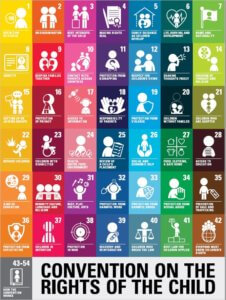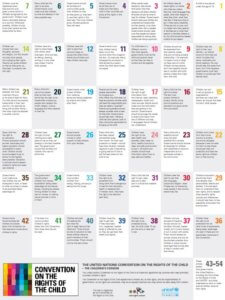Publications
Convention on the Rights of the Child (CRC)
Read the full text of the Convention on the Rights of the Child: English, Français, Español, العربية, русский, 中文
Read the child-friendly version of the Convention on the Rights of the Child: English, French, Spanish, العربية, русский, 中文, All versions.
Our CRC 30th anniversary study (2019): Global Status of Engagement in Reporting to the UN Committee on the Rights of the Child
We have developed practical information for NGOs wishing to report to the UN Committee on the Rights of the child about the children’s rights situations in their countries, including information specifically targeted to the Optional Protocols to the CRC and for those working directly with children on reports.
Short publications with information for NGOs about the UN Committee on the Rights of the Child, its elections, Days of General Discussion, General Comments and Simplified Reporting Procedure (SRP).
Children’s Engagement in the CRC Reporting Cycle
- Moldova: Webcast – An Opportunity for Children to Engage in the Session (2019): English, Français, Español
- Iceland: Children providing inputs to a State party report to the CRC Committee (2021): English, Français, Español
- Collection of Case studies from the first edition (2011) of My Pocket Guide to CRC reporting: English, Français, Español
- Collection of Case studies from the first edition (2011) of Together with children: English, Français, Español
CRC follow-up case studies
Child Rights Connect gathered information from NGOs and NHRIs working at national and international levels to produce case studies about their experiences following up on the CRC reporting process. Each study provides a brief explanation about the activities undertaken and the results.
Child Rights Connect monitors the examination of all countries during the sessions and produces its own summary country reports, highlighting reporting status, main issues discussed and main recommendations included in the Concluding Observations.
Optional Protocol on a Communications Procedure (OPIC)
Find further introductory and background information on our dedicated OPIC minisite, a platform gathering unique resources for anyone working on the OPIC (States, NHRIs, parliamentarians, academics, civil society including children).
Universal Periodic Review (UPR)
With our partner organisation UPR Info, we have developed 4 fact sheets for NGOs on the Universal Periodic Review. The fact sheets include a basic overview of this mechanism as well as information about how NGOs can use it for their advocacy work at national and international levels. We also developed a guide for children on the Universal Periodic Review and how they can meaningfully engage and participate in this process.
This fact sheet provides information for NGOs about how to prepare and submit a written report for consideration in relation to the UPR of a given State. The fact sheet details how best to capture child rights issues and present them in a way that communicates key messages effectively to States.
This fact sheet provides information for NGOS about how to advocate in the UPR. It details the importance of NGO advocacy in the UPR and the key characteristics of an effective advocacy strategy.
A Guide for children on the Universal Periodic Review (UPR) and how they can meaningfully engage and participate in this process.
An audiobook for “The UPR & Me: My Guide to Participating in the UPR”.
Our learning module “The UPR & Me : Sharing your views with the UN on human rights in your country!”
Child Participation Resources
A Guide for Adapting the Child-Friendly Example of the Convention on the Rights of the Child with and for Children in your Context was developed by Queens University Belfast Centre for Children’s Rights to equip adults to empower children to adapt the official text in their context and also serves as an excellent tool when translating any text into a child-friendly format.
Publications for Children and Youth
A Guide for children on the Universal Periodic Review (UPR) and how they can meaningfully engage and participate in this process.
An audiobook for “The UPR & Me: My Guide to Participating in the UPR”.
Our learning module “The UPR & Me : Sharing your views with the UN on human rights in your country!”
The report presents the findings of the DGD children’s global consultations.
A short guide for children, teens and child-led organisations about a new United Nations treaty that lets you speak up about child rights violations.
English, Español, Français, العربية, ру́сский язы́к
Child Human Rights Defenders
The report presents the findings of the DGD children’s global consultations.
- English: 2018 Day of General Discussion Background Paper: Protecting and Empowering Children as Human Rights Defenders
- Français: Note d’information sur la Journée de Débat Général 2018 : Protéger et soutenir les enfants en tant que défenseurs des droits humains
- Español: Documento de información sobre el Día de Debate General 2018: Protegiendo y Empoderando a los NNA como Defensores de los Derechos Humanos
How to Child Rights Series
The How to Child Rights Series is initiated by Save the Children and developed in close collaboration with Child Rights Connect and a range partners. The series of tested practical tools, case studies and guides offers condensed and essential knowledge for civil society practitioners who wish to strengthen programming and advocacy for and with children. Check all tools here!
Organisation Documents
Five year Strategic Plan 2020-2024
Monitoring and Evaluations
With the support of SIDA, the Swedish Development Cooperation, we conducted an external evaluation, which analysed the work of Child Rights Connect and its impact on the realisation of children’s rights. The evaluation looked into the effectiveness of our approaches, and made recommendations for our future work.
“From small beginnings Child Rights Connect has become a highly respected organisation – as one interviewee noted ‘if Child Rights Connect did not exist, it would have to be invented’. The focus on the Human Rights Council as well as the CRC Committee has the potential to lead to a long-term positive impact on children’s rights…”
– Evaluation of the work of Child Rights Connect, 2015
Our Policies
Child Rights Connect is committed to realizing children’s rights around the globe. We acknowledge our duty to be as effective and efficient as possible, as well as to be transparent, accountable, and responsive to all our stakeholders, including children. Our top priority is to be and act as a child safe organisation.




